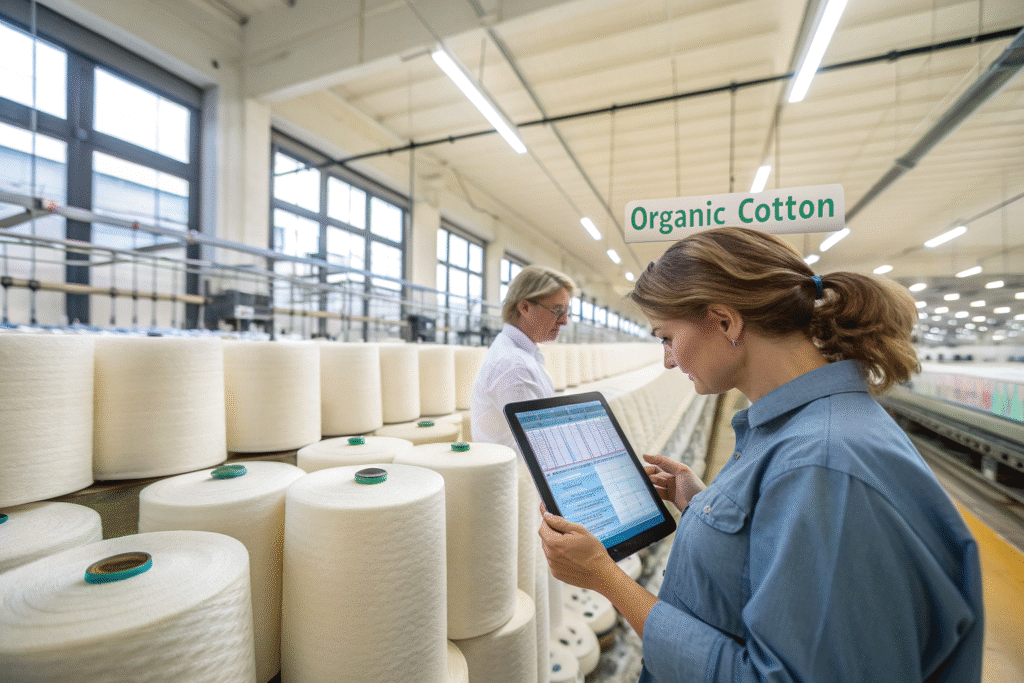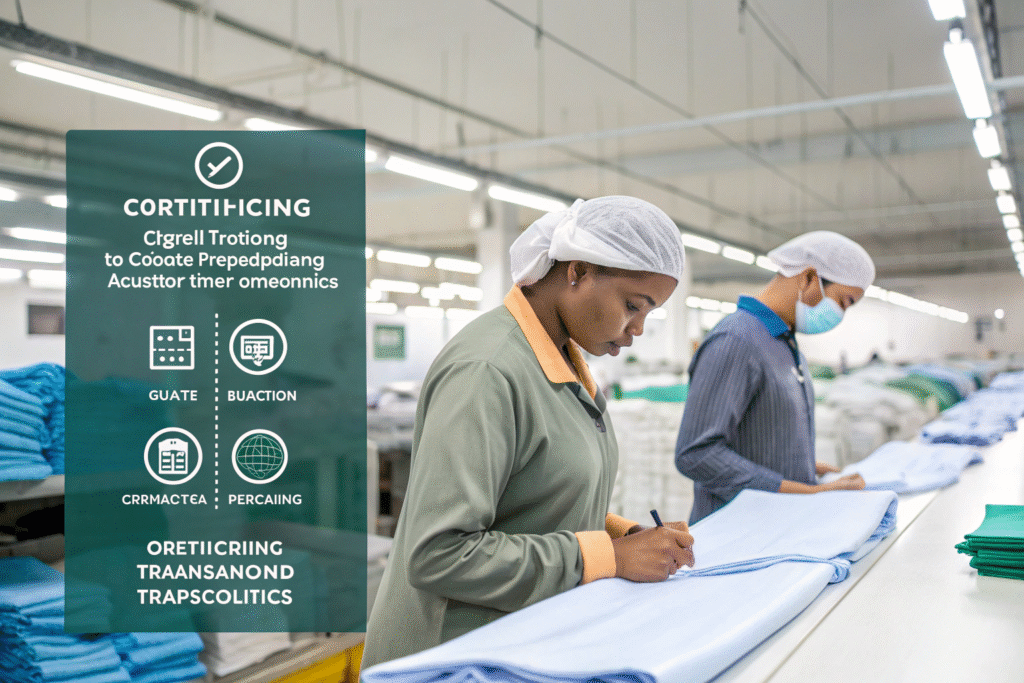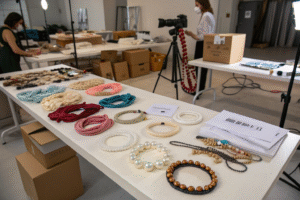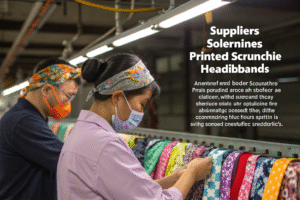Factories that produce organic cotton headwraps face growing demand from global buyers who want proof of ethical sourcing, transparency, and sustainability. Many fashion retailers and wholesalers in the US and Europe now require suppliers to provide clear traceability for organic materials. Without a reliable traceability system, brands risk losing trust, and factories risk losing long-term clients. This article explores how factories like ours can ensure material traceability from cotton fields to finished headwraps.
Factories can provide material traceability for organic cotton headwraps by implementing certification systems, digital tracking platforms, strict supply chain audits, and transparent documentation at every production stage. By doing so, they meet international sustainability standards, gain customer trust, and open access to premium markets.
As a manufacturer of fashion hair accessories, I understand the importance of building long-term trust with wholesale buyers. That trust starts with the materials we use. Organic cotton is not only a fabric; it is a promise of sustainability. To fulfill that promise, factories must establish strong systems of traceability that can be easily verified by international buyers.
Why Is Organic Cotton Traceability Important?
Organic cotton traceability matters because today’s buyers want more than just good design. They want to know the story behind each product they buy. For headwraps, scarves, and fashion accessories, customers increasingly demand assurance that materials are sourced ethically, without harmful chemicals, and under fair labor conditions.
Organic cotton traceability ensures buyers and end consumers can verify that every step—from cotton farming to dyeing to final stitching—follows international standards and sustainability certifications. This transparency protects brands from greenwashing claims and helps factories stand out in a competitive market.

How do certifications support trust?
Certifications such as GOTS and OEKO-TEX play a vital role. When factories obtain these certifications, they can show clients that their organic cotton products meet international standards. For example, GOTS certification covers everything from farming to packaging, making it a complete traceability solution.
Can digital platforms make traceability easier?
Yes. Today, digital solutions like blockchain and ERP systems allow factories to create transparent supply chain records. Platforms such as TextileGenesis are widely used by brands to trace raw materials. These systems provide buyers with a digital “passport” of each headwrap, showing its origin and processing history.
What Systems Do Factories Use for Cotton Traceability?
Factories rely on structured systems to track organic cotton from field to fabric. Without a system, it is impossible to prove that the material is truly organic and sustainably sourced. For buyers, system-based proof is a guarantee of quality.
Factories use a mix of physical labeling, digital records, supplier certification checks, and third-party audits to provide material traceability for organic cotton headwraps. These systems help prevent mixing with non-organic cotton and protect the authenticity of the product.

How does labeling ensure authenticity?
Factories often label cotton bales, fabric rolls, and dye batches with unique barcodes or QR codes. These codes can be scanned at every production step. For example, using GS1 standards, each headwrap can carry a label that connects back to its cotton source.
Why are audits essential?
Third-party audits guarantee that the factory’s traceability system is reliable. Independent inspectors check supplier records, production lines, and material documentation. Reports from Control Union are often accepted globally by buyers, giving confidence that organic cotton traceability is not just paperwork but real practice.
How Do Buyers Verify Traceability Claims?
Buyers today no longer rely only on the supplier’s words. They actively check certifications, request test reports, and even conduct factory visits. For wholesale buyers of headwraps, traceability is not just about fabric—it is about protecting their brand reputation in front of consumers.
Buyers verify traceability by reviewing certifications, checking digital supply chain records, conducting factory inspections, and demanding third-party lab testing reports. This ensures the products meet both legal and ethical requirements.

What role do certification databases play?
Buyers often check supplier claims through certification databases. For example, GOTS public database allows anyone to verify if a factory is certified. This open verification reduces risks of false claims in the fashion industry.
How does product testing add security?
Laboratories like Intertek and SGS provide fiber testing services that confirm whether fabric is organic cotton. Buyers often request these test results before placing large orders. This step provides scientific proof of traceability.
How Can Factories Build Buyer Confidence in Organic Headwraps?
Traceability is not just a technical system. It is a communication tool. Factories that explain their processes clearly and provide accessible proof gain stronger trust from buyers. For headwraps, this trust often leads to repeat orders and long-term partnerships.
Factories build buyer confidence by sharing transparent reports, offering digital access to traceability data, providing quick samples with certification labels, and ensuring smooth logistics and documentation. These actions show professionalism and reliability.

How can digital transparency increase trust?
Providing buyers with login access to digital traceability platforms is a powerful way to build confidence. Many brands prefer suppliers that use blockchain textile solutions because it prevents data tampering. With digital dashboards, buyers can follow their orders step by step.
Why is communication as important as certification?
Even with certifications, poor communication can weaken buyer trust. Factories that provide regular updates, respond quickly to inquiries, and explain their traceability systems in simple terms are more likely to secure long-term business. This mix of technical proof and human connection is key to success.
Conclusion
Material traceability for organic cotton headwraps is no longer an option—it is a requirement. Buyers want proof that the products they source are ethical, sustainable, and authentic. By adopting certifications, digital platforms, audits, and transparent communication, factories can build lasting trust with international clients.
At Shanghai Fumao, we have the infrastructure, partnerships, and professional QC team to support global buyers in developing their organic cotton headwrap collections with full traceability. If you are looking for a reliable manufacturing partner, contact our Business Director Elaine at elaine@fumaoclothing.com to discuss your order.









